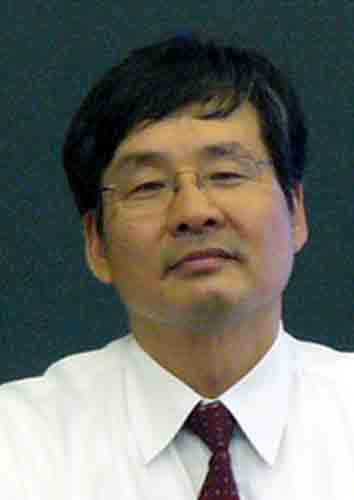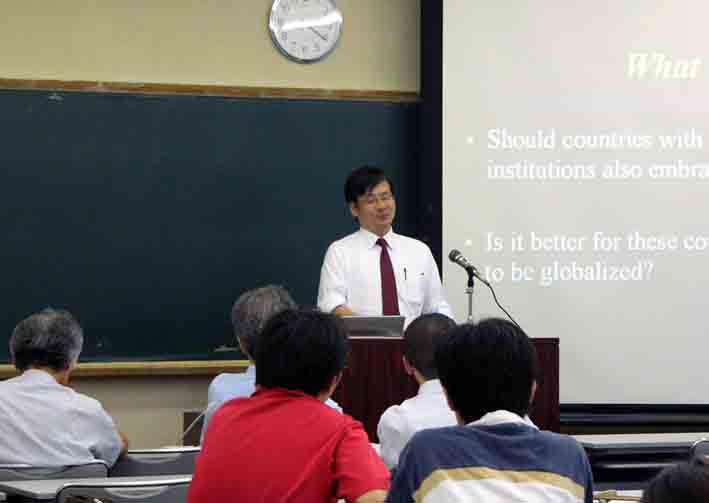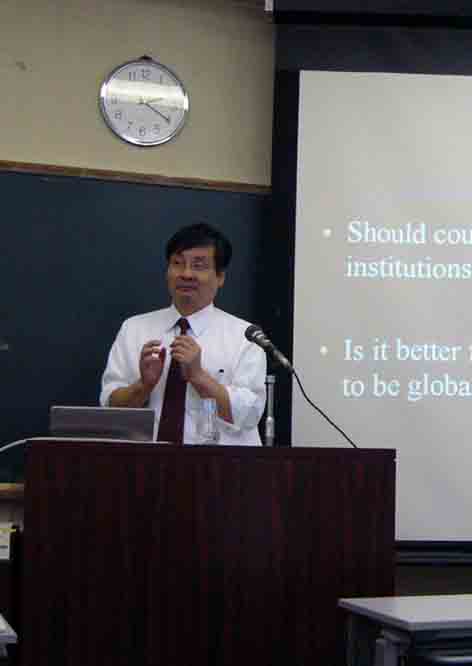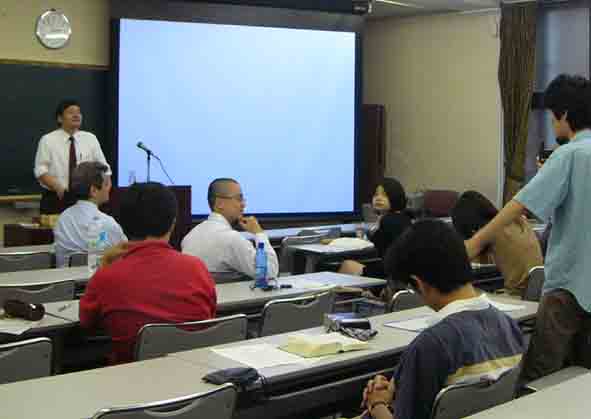トップページ > Events & Forums > 公共経済政策ワークショップ > 2004年度夏学期
公共経済政策ワークショップ
2004年7月9日
"Making the Global Economy Work for All: Career at the IMF"
日野博之(IMFアジア太平洋地域事務所長)
"1: What is the Globalization?"
 First of all we need to start with "What is the globalization?" The answer is that an increase in the world trade and the capital mobility in the world. This is a phenomenon of the globalization. When you think of professional baseball leagues in Japan and United States. There are some restrictions, which prevents those two leagues to get integrated completely. In Japan, there are rules, which forbid more than three foreign players in the game. What if, the Japanese baseball league and the American Major league integrated to one baseball league? We would see more foreign baseball players and less Japanese players. That’s how the market works. This is something like the globalization, which we are going to discuss today.
First of all we need to start with "What is the globalization?" The answer is that an increase in the world trade and the capital mobility in the world. This is a phenomenon of the globalization. When you think of professional baseball leagues in Japan and United States. There are some restrictions, which prevents those two leagues to get integrated completely. In Japan, there are rules, which forbid more than three foreign players in the game. What if, the Japanese baseball league and the American Major league integrated to one baseball league? We would see more foreign baseball players and less Japanese players. That’s how the market works. This is something like the globalization, which we are going to discuss today.
"2: The History of Globalization"
 Up until now from the end of the nineteenth century, we have been experiencing the globalization sometime in larger extents and sometime in small extents. The first globalization was in the end of the 19th century to before the Great Depression. Years around WW2, the impact of the globalization was shrunken. And after the WW2, the globalization had gradually been recovered. In 1980’s the world experienced two significant economic changes, which are called "Thatcherism in UK" and "Reaganomics in US". Both of them were attempts to introduce the market power into the economies and put more restriction on government’s interferences into the economy. These two challenges help the world economy to be globalized. And in the last decade UK and USA enjoy economic prosperities thanks to their economic changes
Up until now from the end of the nineteenth century, we have been experiencing the globalization sometime in larger extents and sometime in small extents. The first globalization was in the end of the 19th century to before the Great Depression. Years around WW2, the impact of the globalization was shrunken. And after the WW2, the globalization had gradually been recovered. In 1980’s the world experienced two significant economic changes, which are called "Thatcherism in UK" and "Reaganomics in US". Both of them were attempts to introduce the market power into the economies and put more restriction on government’s interferences into the economy. These two challenges help the world economy to be globalized. And in the last decade UK and USA enjoy economic prosperities thanks to their economic changes
"3: Neo-Classical Theories of Globalization"
Advocates of classical economics theories say that free trades among countries stimulate the economic growth of the whole economics system. But the reality we see in the era of the globalization is different from what those classical economists have proven. Given we have two countries, one is developed country who has more capital and less labor and the other is developing country who has less capital and less labor.Theoretically, a free trade between two countries make both of them be better off. But now we see that every goods, all the money, and all the people are gathering into the rich countries. Therefore the inequality between the rich and the poor is widening right now. Now we need to ask ourselves; does globalization raise economic growth for all the nations in the world?
"4: The current flow of Globalization"
The ratio of the average income in the developing countries compared to the average income in the United States has been declining for decades. Which means that there is clear evidence of the income inequality has been widening. But if the globalization widens the inequality in the world, why do we push it to the world? The answer is that the globalization has a big impact on the economic growth in the world.
Historically, growth rates are higher when the power of the market was relatively more dominant than when the state power was dominant. The reason is that the globalization makes goods and financial assets more freely moved. It causes an economic growth.
"5 Crises caused by the Globalization"
 Of course we shouldn’t forget that the market failures do occur. We can see uncountable financial crises all over the world in the 1990s. But actually, crises are not always bad. Small crises strengthen the market structure of the countries. That’s what we can observe from countless experiences of crises in 1990s. When we look at economic performances of the countries, which had financial crises because of the globalization, their performances are better than other countries, which didn’t have economic crises.Therefore the IMF strongly insists the globalization is good thing for the world economy.
Of course we shouldn’t forget that the market failures do occur. We can see uncountable financial crises all over the world in the 1990s. But actually, crises are not always bad. Small crises strengthen the market structure of the countries. That’s what we can observe from countless experiences of crises in 1990s. When we look at economic performances of the countries, which had financial crises because of the globalization, their performances are better than other countries, which didn’t have economic crises.Therefore the IMF strongly insists the globalization is good thing for the world economy.
"6: Experiences of IMF Economics Policies"
As an economist of the IMF, I have been working in various countries that need help to manage their economy under the era of the globalization. In one country in Africa, I worked there as an economic adviser for the government. The president of the country strongly insisted that he wthat the process was necessary for the country’s economic growth. Somebody has to take a risk. In this country, all the people in the government were willing to take the risk.
In the other country of Asia, bureaucrats in the country didn’t want to accept the current flow of the globalization. We though the county has many resources and potentials for economic growth. So we push them to deregulate the financial market and stimulate free trades. But no one in the government wanted to take a risk. Now this country is doing deregulation under the supervision of the IMF slowly and step by step. I am sure these small steps will make those government officials to leap further and this country will eventually gain an economic prosperity from the globalization. Once you made a decision, you have to make case of it!
"7: Conclusion"
Now, I want to ask all of you this question: Should countries with inadequate institutions also embrace globalization? And is it better for these countries to choose not to be globalized? We all know that it depends on the countries. But I would say, "just go and do it". Somebody have to take a risk. As the world biggest advocate of the globalization, the IMF will support countries who want to get along with the market and the globalization.
"8: About a career in the IMF"
The head quarter of the IMF is in WashingtonUSA. It is pretty good environment to work. The main roles of the IMF are that: Promote Global Financial Stability and Assist in the Global War on Poverty. The main areas of activity of IMF are surveillance, Technical assistance, Research, and Financial assistance. Currently Japan is the second donor of our fund. But unfortunately we don’t have many Japanese in IMF. Japan doesn’t contribute in terms of human resources unlike we do in terms of donating money. So it is my job to recruit young Japanese economists into the IMF. If you are interested in a career in the IMF, Please let me know. Thank you.
Questions and Answers
 Q: Regarding corruption problems in governments in developing countries, what do you do to deal with the problem? Could you tell us the official view of the IMF?
Q: Regarding corruption problems in governments in developing countries, what do you do to deal with the problem? Could you tell us the official view of the IMF?
A: Basically it is not our first duty to solve that problem. But if we have to deal with that, we ask auditors to report the government’s balance sheet. The auditor have to be independent from both IMF and the government.
Q: Could you tell us how the IMF interacts with Non-Governmental Organization or Non-Profit Organization?
A: Basically we don’t have many connections with those organizations. This is because we work for governments in financial troubles.
*上記講演要旨は学生の手によってまとめられたものです。
